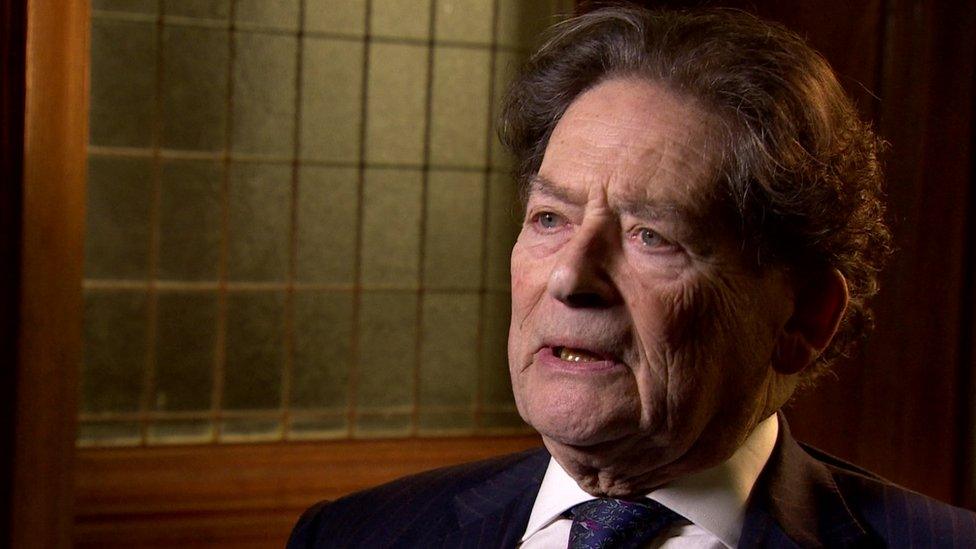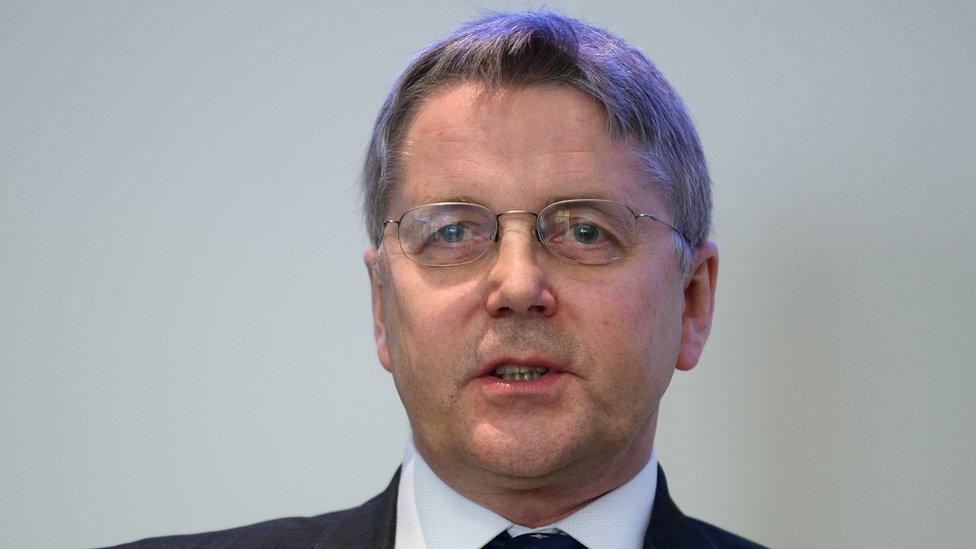Lord Lawson: Civil servants want to 'frustrate Brexit'
- Published

Lord Lawson of Blaby served as chancellor between 1983-89
Civil servants will "do their best to frustrate" Brexit, Lord Lawson has said in an interview with BBC Newsnight.
The former chancellor said Whitehall felt uneasy about Brexit because it represented radical change.
His remarks highlight unease in the cabinet at the civil service's handling of Brexit.
Cabinet secretary Sir Jeremy Heywood responded by saying that the civil service prided itself on supporting the mandate of the government of the day.
In a statement to Newsnight, Sir Jeremy said: "In this case the mandate has come from the British people, has been endorsed overwhelmingly by Parliament and is the driving mission of the current government."
The cabinet secretary issued a rare statement after Lord Lawson spoke to Newsnight as part of a profile of Olly Robbins, the senior civil servant who serves as Prime Minister Theresa May's chief adviser on the EU.
Known as the prime minister's EU "sherpa", Mr Robbins works by her side in Whitehall and is the day-to-day UK Brexit negotiator with the European Commission in Brussels.
'Radical change'
Lord Lawson of Blaby, who served as chancellor between 1983-89, said his period in government showed that civil servants will implement radical change only if they are given strong political direction.
Lord Lawson told Newsnight: "The officials will do their best to frustrate this process because it goes against the grain so fundamentally. But they equally realise their constitutional duty to accept the leadership of the politicians, of the elected government."
The former chancellor, who was one of former Prime Minister Margaret Thatcher's strongest supporters until they fell out in 1989, thought the 1980s provided a useful parallel.
He said: "Brexit is a most radical change of direction for this country. The idea that any bureaucrat could be in favour of radical change is a nonsense. Bureaucrats by their very nature loathe radical change of any kind.
"I was... a member of the Thatcher government. We came in and introduced radical change in economic policy. All the officials were aghast. They thought it would be a disaster. But at that time we had a strong cabinet led by an outstanding prime minister and they accepted the political leadership as is their constitutional duty.
"So we made this radical change and it worked out very well. It is really the job of the government, the cabinet and above all the prime minister to force this through."
Morale 'at record-levels'
Sir Jeremy rallied to the defence of the civil service. In a statement issued to Newsnight, the cabinet secretary said:
"The civil service has always prided itself on supporting the elected government of the day in carrying out its mandate. In this case the mandate has come from the British people, has been endorsed overwhelmingly by Parliament and is the driving mission of the current government.

Sir Jeremy Heywood said the civil service prided itself on supporting the mandate of the government of the day
"The civil service is putting enormous effort and many of its very best people into making a success of the project. It is being tested on a daily basis and I am very proud of what we have - so far - delivered. Morale is at record-levels, proving once again that the civil service is at is very best when under pressure."
The criticisms by Lord Lawson, who stressed that he was speaking about the civil service in general because he does not know Mr Robbins, reflect the private views of some cabinet ministers.
One senior minister said he believes that Mr Robbins regards Brexit as a crisis to be managed rather than an opportunity to be seized.
Speaking anonymously, the minister told Newsnight: "The civil service is very defensive on Brexit. They do see it as a problem."
Tom Fletcher, an Oxford contemporary of Mr Robbins who later served alongside him as a senior official in Downing Street, strongly defended his old friend. He described Mr Robbins as an impartial civil servant committed to implementing the wishes of his political bosses.
Mr Fletcher told Newsnight: "[Olly Robbins] believes in public service. My impression is he believes he is there to work for the minister, for the prime minister. That comes through all of his interactions with them. It is not like an episode of Yes Prime Minister."
Mr Robbins, a low profile official who started his Whitehall career as a high flying Treasury official, wields immense influence in Whitehall. His proximity to the prime minister, from his perch in the cabinet office, means that he speaks with authority on her behalf in Whitehall, in Brussels and during visits to other EU capitals.
Some Leave figures in government regard him with suspicion. Mr Robbins is understood to be aware of the criticisms and has worked hard to build up relations with the likes of Boris Johnson and Michael Gove.
EU 'sherpa'
Mr Robbins was appointed as the prime minister's EU "sherpa" and as the founding permanent secretary of the new department for exiting the EU (DEXEU) in 2016. He won Mrs May's confidence as a senior Home Office official during her time as home secretary.
In September, he dropped his post as permanent secretary at DEXEU to allow him to concentrate on his sherpa role on behalf of the prime minister.
Watch the full Newsnight profile of Olly Robbins on BBC iPlayer.
- Published30 December 2020

- Published31 December 2017

- Published15 December 2017
